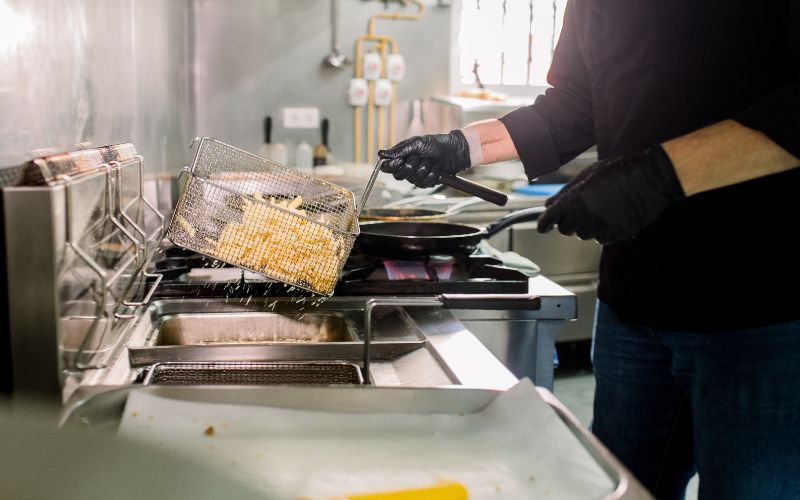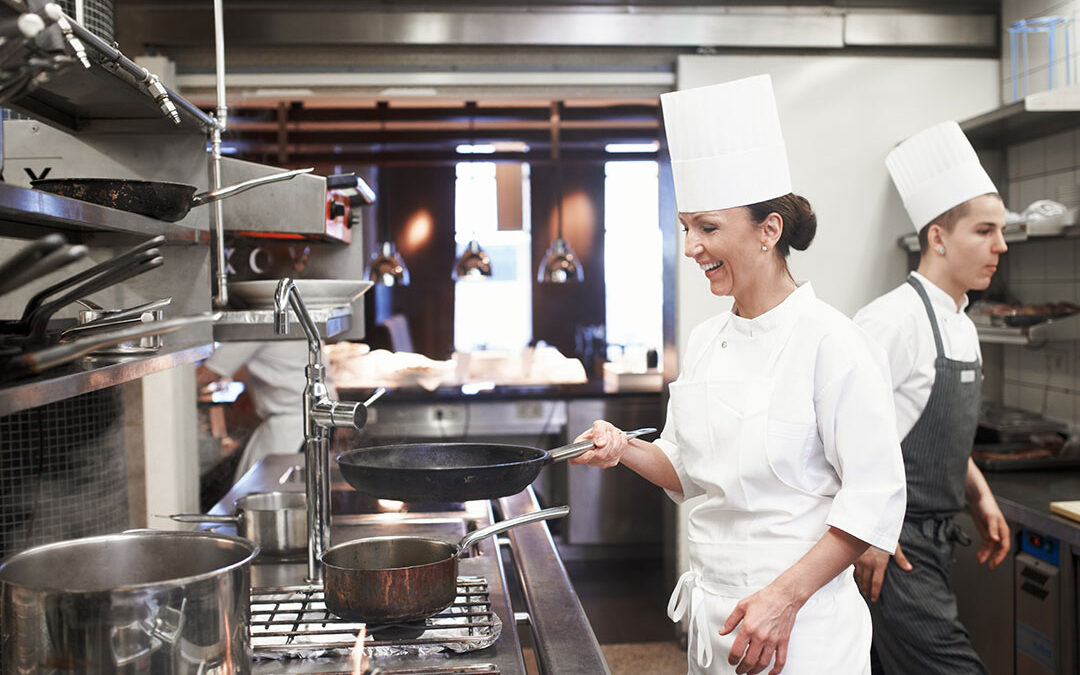
by Budget Food Equipment | Feb 19, 2025 | Restaurant Tips
Frying oil is the backbone of any commercial kitchen that serves crispy, golden perfection. But while great frying oil can elevate a dish, poor oil management can lead to off-flavours, wasted product, and unnecessary costs. The secret to working with oil is protecting your oil from the six biggest threats that shorten its lifespan and degrade food quality. If you can keep these factors under control, you’ll not only improve consistency and flavour but also reduce waste and cut down on unnecessary oil replacements. Let’s dive into the six biggest threats to frying oil—and what you can do to combat them.
1. Oxygen Exposure (Oxidation)
Why it’s a problem:
- The more your oil interacts with oxygen, the faster it breaks down. When oil oxidizes, it forms chemical compounds that lead to off-flavours, unpleasant odors, and a shorter frying lifespan
How to prevent it:
- Keep fryers covered when not in use.
- Minimize stirring, splashing, and unnecessary agitation of the oil.
- Use a filtration system and limit oil recirculation time during filtering.
2. Food Debris & Carbon Build-Up
Why it’s a problem:
- Leftover crumbs and food particles sink to the bottom of the fryer, burning over time and releasing rancid flavours into your oil. This not only affects taste but also increases foaming and darkens the oil faster.
How to prevent it:
- Skim the fryer regularly to remove food debris.
- Filter the oil daily to remove carbonized particles.
- Use high-quality frying oils with a higher smoke point to slow degradation.
3. Salt (Before Frying)
Why it’s a problem:
- Salt accelerates oxidation and breaks down oil faster, leading to a darker color and off-flavours. It also causes foam formation, which can make frying less efficient and increase splattering.
How to prevent it:
- Season after frying, not before.
- Avoid refrying foods that have already been salted.
- Keep seasoning away from open fryers to prevent cross-contamination.
4. Water & Moisture
Why it’s a problem:
- Water and oil don’t mix. Moisture introduced to hot oil causes rapid breakdown, excess splattering, and steam formation that accelerates oil degradation.
How to prevent it:
- Fully thaw frozen foods before frying.
- Pat ingredients dry to remove excess moisture before placing them in the fryer.
- Avoid overloading the fryer basket, which can lead to excess steam buildup.
5. Light Exposure
Why it’s a problem:
- Direct light, especially sunlight or bright kitchen lighting, speeds up the oxidation process, leading to oil spoilage and rancidity.
How to prevent it:
- Store oil in a cool, dark place when not in use.
- Use containers that block light (avoid clear plastic or glass).
- Keep fryer vats covered when idle to reduce exposure.
6. Excessive Heat
Why it’s a problem:
- While frying requires high temperatures, consistently overheating oil can accelerate its breakdown and cause food to cook unevenly.
How to prevent it:
- Monitor and maintain proper frying temperatures—typically between 325°F and 375°F, depending on the food.
- Calibrate fryers regularly to ensure they heat accurately.
- Turn off unused vats to prevent unnecessary heat exposure.
Better Oil, Better Business
Managing frying oil ensures high-quality food that keeps customers coming back. By minimizing exposure to these six oil-damaging factors, you’ll extend the life of your frying oil, improve flavour consistency, and maximize your return on every drop. Looking for better ways to optimize your kitchen operations? Explore our top-rated commercial fryers and oil filtration systems today.

by Budget Food Equipment | Feb 8, 2025 | Restaurant Tips
Every piece of commercial kitchen equipment represents a significant investment in your restaurant’s success. The secret to protecting that investment? A simple, consistent maintenance schedule.
Prevent Problems Before They Start
Small maintenance tasks today can prevent major equipment failures tomorrow. Regular upkeep helps you:
- Avoid unexpected repair costs
- Prevent service interruptions
- Extend your equipment’s lifespan
- Maintain warranty coverage
- Keep your kitchen running efficiently.
Creating Your Maintenance Schedule
Running a busy kitchen is demanding, but maintaining your equipment doesn’t have to be. Start by:
- Gathering all your equipment manuals in one place
- Noting the recommended maintenance schedule for each piece
- Creating a simple calendar of daily, weekly, and monthly tasks
- Training your staff on basic maintenance procedures.
Why This Matters to Your Bottom Line
In the Fraser Valley’s competitive restaurant scene, equipment downtime means lost revenue. Regular maintenance isn’t just about preventing repairs – it’s about protecting your profitability and ensuring consistent service for your customers.
Need Guidance?
As your local equipment partner, we’ve helped Fraser Valley restaurants maintain their kitchen equipment for over 30 years. If you need advice on maintenance schedules or have questions about caring for specific equipment, our team is here to help.

by Budget Food Equipment | Feb 7, 2025 | Finance
Opening or upgrading a restaurant is exciting – but getting your equipment financing in order can feel overwhelming. Here’s a straightforward guide to preparing your equipment financing application and setting yourself up for success.
Create One Master Folder
Your first step is simple: create a single folder (digital or physical) for all your documents. This organization helps you avoid the last-minute scramble to find important paperwork and keeps your application process smooth and professional.
Be Open About Your Financial Story
Every restaurant’s journey is different. If you have gaps in your financial history, don’t worry. Our financing partners understand that businesses have ups and downs. The key is being upfront about your situation – it helps build trust and often leads to better financing solutions.
Talk to the Experts First
Before submitting your application, reach out to our financing partners at SilverChef or EconoLease. Their teams specialize in restaurant equipment financing and can help you:
- Understand exactly what documents you need
- Review your application before submission
- Find the best financing program for your situation
Understand Your Terms
- Take time to review and understand:
- Interest rates and how they affect your payments
- Your repayment schedule
- What happens at the end of your term
- Any fees or additional costs
Why This Matters
In the Fraser Valley restaurant scene, having the right equipment can make or break your success. Proper financing ensures you get the equipment you need without straining your cash flow.

by Budget Food Equipment | Feb 5, 2025 | Restaurant Tips
After 30+ years of supporting Fraser Valley restaurants, we’ve heard every equipment maintenance question imaginable. Here are the critical answers you need to keep your kitchen running safely and efficiently.
Installation Matters: Don’t Skip the Professionals
While it might be tempting to have a handy friend or family member install your commercial equipment, this decision could cost you dearly. Only factory-trained, ticketed, and insured professionals should handle your installation. Why?
Professional installation:
- Maintains your warranty coverage
- Ensures safety compliance
- Prevents costly equipment failures
- Provides documented proof of proper setup
Power Problems? Check All Panels
If your equipment isn’t powering up despite having building power, don’t panic. Commercial buildings typically have multiple power panels. Take time to check them all before calling for service.
The Extension Cord Myth
Here’s a critical rule: Never use extension cords with commercial kitchen equipment. This isn’t just a suggestion – it’s a safety requirement that:
- Keeps your warranty valid
- Prevents fire hazards
- Ensures proper power supply
- Maintains insurance coverage
Overheating Issues: Look Deeper
When equipment repeatedly triggers its overload switch, it’s telling you something important. Rather than simply resetting the switch, investigate the root cause:
- Check your cleaning schedule against the manual
- Verify proper installation
- Inspect ventilation and clearances
- Review operating procedures
Refrigeration Maintenance: The Quarterly Rule
Mark your calendar: refrigeration units need thorough cleaning every three months. Focus on:
- Cleaning condensers
- Removing debris
- Checking airflow
- Inspecting seals
Warranty Support: Direct Is Best
For warranty issues, always contact your warranty provider directly. Keep your warranty information readily available and reach out to the manufacturer first. While we’re always here to help with equipment needs, warranty claims work best when handled directly with the provider.
Stay Ahead of Problems
Regular maintenance isn’t just about preventing problems – it’s about protecting your investment and ensuring your kitchen runs smoothly. Need guidance on maintaining specific equipment? Our team of Kitchen Equipment Advisors is here to help you develop an effective maintenance strategy.

by Budget Food Equipment | Feb 1, 2025 | Finance
Calculate your payments with the Silverchef Calculator.
Apply with Silverchef here!




